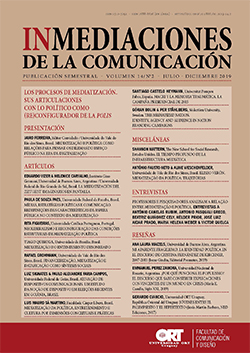The midiatization of <i>zeitgeist</i>. Imaginaries on the screen
DOI:
https://doi.org/10.18861/ic.2019.14.2.2912Keywords:
Zeitgeist, ICT, imaginaries, screens, spirit of an era.Abstract
Zeitgeist’s nineteenth-century concept is defined as “spirit of an era”. It emerged from romanticism and german Philosophy of History. It represents the spiritual and conceptual essence (or the geist) of a particular time, place and people (Germany of the late eighteenth and early nineteenth centuries) and is also the product of a zeist (an era). We propose that the zeitgeist of our times predominantly manifests itself through Information and Communication Technologies (ICT), social networks, the increasing digitalization of information and the material production itself, as well as everyday human practices mediatized by technologies. Social institutions themselves, politics and the physical economy tend to “materialize” on the screens of a virtual world governed by the processes of digitalization (the Information Society emerging through the processes of the cognitive economy). A reality physically based on screens, on material devices whose intrinsic value is not found in “objects” but in processes, images and data. An inmaterial world of signs and information conditioning all forms of reality. A reality governed by algorithms, Artificial Intelligence, interfaces, pixels, images, etc. The idealist “nineteenth-century spirit” of the zeitgeist of the 21st century has materialized in a universe of ubiquitous screens.
Downloads
References
Barabási, L. A. (2009). LINKED. A nova ciencia das networks. São Paulo: Leopardo.
Berman, M. (1998). Tudo que é sólido desmancha no ar. São Paulo: Schwarcz.
Castoriadis, C. (1975). L’Institution imaginaire de la société. Paris: Seuil.
Durand, G. (1998). Campos do imaginário. Lisboa: Instituto Piaget.
Feuerbach, L (1963). La esencia del cristianismo. Buenos Aires: Claridad.
Freud, S. (1997). O Mal-Estar na civilização. Rio de Janeiro: Imago.
Gorz, A. (2005). O immaterial: conhecimento, valor e capital. São Paulo: Annablume.
Hjavard, S. (2013). A midiatização da cultura e da sociedade. São Leopoldo, Brasil: UNISINOS.
Jenkins, H., Green, J. & Ford, S. (2014). Cultura da Conexão. São Paulo: Opus.
Kessler, M. & Leppin, V. (2005). Johann Gottfried Herder. Aspekte seines Lebenswerks, Berlin: Gruyter
Negri, A. & Lazzarato, M. (2001). Trabalho imaterial. R. de Janeiro: CIP-Brasil.
Nietzsche, F. (1981). Así habló Zarathustra. Madrid: Alianza.
Nietzsche, F. (2008). Humano, muy humano. Un libro para espíritus libres. Ciudad de México: Editores Mexicanos Unidos.
Rudiger, F. (2007). Introdução as teorias da Cibercultura. Porto Alegre: Sulina.
Sodré, M. (2006). As estratégias sensíveis. Rio de Janeiro: Vozes.
Souza, J. (2001). Democracia hoje. Novos desafios. Brasilia: UNB.
Vizer, E. A. & Carvalho, H. (2009). Comunicação, Trabalho e subjetividade: Notas sobre capitalismo informacional. Em Brittos, V. C. (ed.), Digitalização e práticas sociais (pp. 61-76). Porto Alegre: Ed. UNISINOS.
Vizer, E. A. & Carvalho, H. (2015). Cuerpos mediatizados. Reflexiones sobre el estatuto de los cuerpos a partir de la Modernidad. En Hoyos, P. & Solon, C. (comp.), Cuerpo y comunicación (pp. 357-390). Bogotá: Universidad Autónoma de Colombia.
Vizer, E. A. & Carvalho, H. (2008). Notas sobre Economía Política da Informação e da Comunicação Em Cruz, V. (Org.), Economía Política da Comunicação. Estrategia e desafios (pp. 77-92). Rio Grande do Sul: UNISINOS.
Vizer, E. A. (2009). Etapas de la cultura tecnológica y creación de valor. En Brittos, V. & Haussen, D. (eds.), Economía Política, Comunicação e Cultura (pp. 181-200). Porto Alegre: EdiPUCRS.
Vizer, E. A. ([2003] 2011). A trama (in)visível da vida social. Comunicação, sentido e realidade. Porto Alegre: Sulina.
Vizer, E. A. (2012). Lo que McLuhan no predijo. Buenos Aires: La Crujía.
Vizer, E. A. (2015). Metáforas de Identidad: del ‘mundo interior’ a las identidades virtuales. Intexto, 34, 467-491.
Vizer, E. A. (2018). Notes for an ontology of communication. About the materialities of communication. Perspectivas de la Comunicación, 11(2). Recuperado de: http://revistas.ufro.cl/ojs/index.php/perspectivas/issue/current





